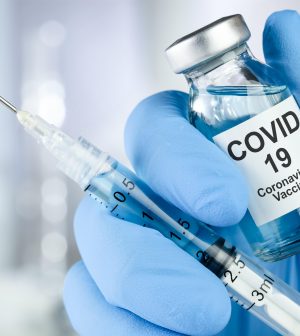- Could Your Grocery Store Meat Be Causing Recurring UTIs?
- Are You Making This Expensive Thermostat Error This Winter?
- Recognizing the Signs of Hypothyroidism
- 10 Strategies to Overcome Insomnia
- Could Artificial Sweeteners Be Aging the Brain Faster?
- Techniques for Soothing Your Nervous System
- Does the Water in Your House Smell Funny? Here’s Why
- Can a Daily Dose of Apple Cider Vinegar Actually Aid Weight Loss?
- 6 Health Beverages That Can Actually Spike Your Blood Sugar
- Treatment Options for Social Anxiety Disorder
A ‘Universal’ COVID Vaccine Could Save Billions If Another Pandemic Strikes

A universal coronavirus vaccine could have saved millions of lives and billions of dollars if one had been available prior to the pandemic, a new study argues.
Further, a universal vaccine — one that targets parts of the virus common to all coronaviruses — could still be a game-changer in the future, researchers say.
But that’s only possible if one is developed before another variant mutates and runs rampant through the human population.
“COVID-19 was the third major and serious coronavirus epidemic or pandemic following SARS in 2002 and MERS in 2012, thus, we should anticipate a fourth coronavirus outbreak within the next decade or so,” said researcher Dr. Peter Hotez, dean of Baylor College’s National School of Tropical Medicine and co-director of the Texas Children’s Hospital Center for Vaccine Development.
“A universal vaccine is cost-effective and cost-saving, and a priority for advancement,” Hotez added.
To figure out the potential value of having had a universal vaccine at the start of the pandemic, Hotez and his colleagues developed a computer model that simulated the entire U.S. population through the introduction and spread of COVID in 2020.
Specifically, the simulation weighed what might have happened if a universal coronavirus vaccine had been available at the start.
As history shows, scientists developed a strain-specific COVID vaccine in record time, but that still left 10 months of unchecked infection, illness and death.
Using the simulation, researchers determined that a universal vaccine would have saved money even if it had only been 10% effective against COVID and a minority of the populace had received the jab.
For example, a vaccine with 10% efficacy administered to a quarter of the U.S. population within two months of the start of the pandemic would have averted 14.6 million infections and saved more than $27 billion in direct medical costs, researchers estimate.
The benefits of a universal coronavirus vaccine would have held even if pharmaceutical companies had later crafted a better, more variant-specific vaccine, the model showed.
The findings were published Jan. 11 in the journal eClinicalMedicine.
“Our study shows the importance of giving as many people as possible in a population at least some degree of immune protection as soon as possible,” said researcher Dr. Bruce Lee, a professor at the CUNY Graduate School of Public Health and Health Policy in New York.
“Having a universal vaccine developed, stockpiled and ready to go in the event of a pandemic could be a game-changer, even if a more specific vaccine could be developed three to four months later,” Lee added in a CUNY news release.
More information
The National Institutes of Health has more about universal coronavirus vaccines.
SOURCE: CUNY Graduate School of Public Health and Health Policy, news release, Jan. 11, 2024
Source: HealthDay
Copyright © 2026 HealthDay. All rights reserved.










